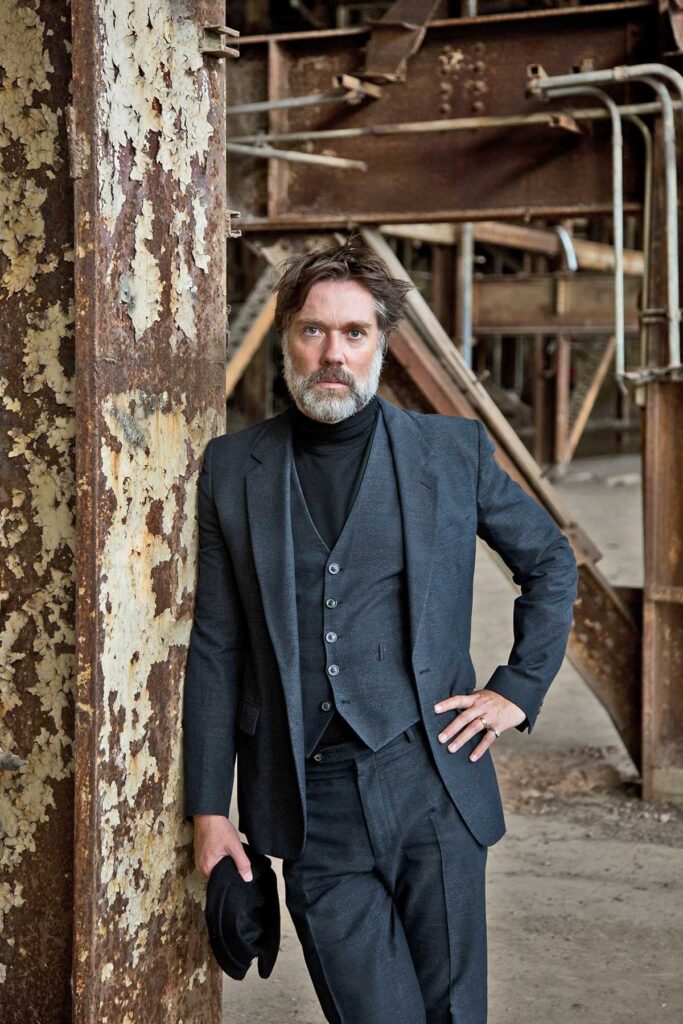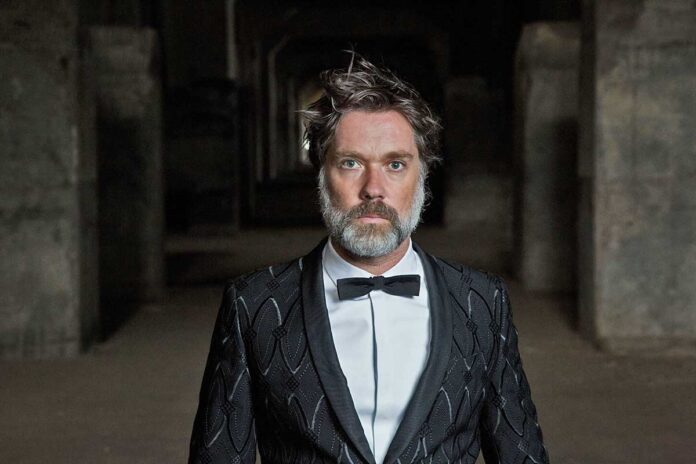It all started with Rufus Wainwright in his bathrobe. The crooner, at the forefront of virtual pandemic performances in March 2020, performed a song a day at his home piano in the Hollywood Hills during his “Quarantunes Robe Recital” series for fans on IGTV.
Nearly a year into the pandemic, Wainwright has found himself doing what, for him, once seemed impossible – embracing the very technology he had adamantly abhorred. But since concert halls are still temporarily shut down due to COVID, Wainwright has, like many artists, turned to virtual platforms and even realized their virtues.
“A song a day” turned into 45-minute concerts (no robe, real clothes) for live-streaming concerts platform Veeps, entitled “Rufus-Retro-Wainwright-Spective!” The series continues this year as Wainwright reaches back into his catalog to perform parts of his studio albums “Out of the Game,” “Take All My Loves: 9 Shakespeare Sonnets” and “Unfollow the Rules,” along with cover songs. Additionally, Wainwright performs a special program of soundtrack songs called “Rufus at the Movies” and two “Rarities” concerts.
Released in 2020, “Unfollow the Rules” is Wainwright’s latest studio album, which earned him his second Grammy nomination for Best Traditional Pop Vocal Album. Winners will be announced March 14.

How would you describe where you are on the pandemic front now?
Well, I’m in L.A., arguably the worst place to be on Earth. Obviously we have a new administration, and that’s a great thing. L.A. is actually a good example of the need for a kind of national strategy. I think without the government behind you, you’re gonna eventually fail (laughs) when you’re dealing with pandemics. So, sadly, we are the guinea pig in that experiment. I’m pretty sure we’ve learned that lesson.
I talked to you last year, and at that point we didn’t know what was going to happen with the pandemic. So much has changed that you have had to sort of become more technologically advanced. You have a whole crew working with you.
Yeah, one of the plus sides of this pandemic situation is that before COVID I really had a very negative view of the internet and social media. I tended to pooh-pooh it on a regular basis and thought it was kind of, you know, below me.
I think it’s still a double-edged sword, obviously, in the sense that there’s very frightening sides of it, especially when you look at the political landscape. But nonetheless, I now rely on it, and I have a lot to be thankful for in terms of what it’s brought me. It’s kept my career going.
I do have a strong sense that there will be a kind of Renaissance after this period. I don’t know if it will match the Italian Renaissance necessarily, but there’s going to be a real outburst of creative work because there’s just a lot to process, obviously.
Are you tapping into that right now?
Oh yeah.
How so?
I’ve been writing a lot. Even though I’ve written two operas and worked on the Shakespeare sonnets project and made a lot of albums, everybody’s always like, “Rufus, when are you going to write a musical? I mean, it’s ridiculous.” So I’ve actually had a chance in this pandemic period to really think of stories that interest me and really start to talk to writers and directors and producers about starting to lay the groundwork for some of the project.
Stage or movie musical?
Either. I think the main goal is just to find that story that speaks to me and others.
What happened to the locks?
I just… what happened? Well, I’m of a certain age (laughs) where long hair just makes you… it starts to make you look scary. When you’re young — or not even too young, but let’s say in your 30s and under — you can pull the Jesus card occasionally, but not when you’re over 40. It starts to look more John the Baptist.
A “Rufus-Retro-Wainwright-Spective!” is a mouthful. I actually have to slow down to say it. Can you say that three times in a row? Because I can’t.
Well, it’s good to slow down. Rufus-Retro-Wainwright-Spective, Rufus-Retro-Wainwright-Spective. I say it all the time, so I know it, but yeah, that being said, it’s good to slow down.
How did these retrospective concerts come about?
I have to credit a lot of these ideas to my husband, Jörn [Weisbrodt], who’s also my manager. Before COVID, he started filming me every morning when I would rehearse a little bit and would occasionally put things out on Instagram because that’s what one was starting to do a lot of. Then when COVID [happened], he immediately had the idea of doing a song day, which we did for about 60 days — the Robe Recitals.
So that started then, and that really meant a lot to a lot of people, myself included. It was a wonderful opportunity for me to go through my catalog, and so forth, and sing a lot of songs I hadn’t thought of in a long time.
But then tours were canceled, band members had to be furloughed, and I was like, “I gotta start charging for this.” (Laughs.) We just said, “Well, let’s make it into a real retrospective of my studio albums with a more COVID-friendly ensemble.” So there’s only three of us playing together. It’s been wonderful. It’s been really great.
I also have one or two celebrity guests who come. We’re all tested and we’re all wearing masks, except me. I’m not wearing a mask because I’m singing. We also raise money for a charity of their choosing. We’ve had Jamie Lee Curtis; we had Darren Criss, we had Joel McHale. It’s a bit of a Hollywood hang.
Are you getting used to not performing in front of a real audience? Is that still weird?
I miss performing in front of an audience. I will say that before COVID, I was working too much. I was touring my ass off for years, and that first three or four months, even five months, of COVID was actually a real godsend. I needed to stop. I needed to slow down. I think even the world needed that, just to kind of get some perspective. So I learned to appreciate that, and I feel very fortunate that I was able to do that and not lose my job and keep my house and everything. But that being said, I’m dying to go out now. I’m really itching to hit the road.
You’re slated to tour this summer in Europe. Do you still expect to?
Your guess is as good as mine. If I had to put money on a date or a period, I would say August, probably. I could see August really happening. But that’s all I can say. It doesn’t mean that the rest of the summer won’t happen, but I just feel like [there will] be more of a solid system together by August for touring, whether it’ll be socially distant or have smaller capacities. We’ll see.
You’ll also be doing a virtual “Rarities” program. What is that going to look like?
That was a suggestion from one of the fans. It’s kind of an interesting idea. I haven’t gone over the list yet totally, so I can’t really express too much of what’s going to happen. But what’s fun is: I think now I write songs for lots of purposes, whether it’s trying to get on the radio, or for a musical, or for a movie, or what I’m experiencing myself personally. But I think there was a time when I was younger when I really went out on a lot of weird limbs, that kind of youthful sophomoric confidence that I think some of those songs [are] imbued with.
What do you think are your “weird limbs?”
There are probably a lot of songs I wrote back then where I had no sense of purpose. It was completely experimental and completely just getting lost in the material. Like, I hadn’t really loved yet, I hadn’t really experienced loss, I hadn’t really been sick or seen death. So there’s this sort of innocence that exists in some of them, so I’m excited to revisit that funny little boy.
Now that you have lived through some of those life experiences, perhaps your perspective might’ve shifted in how you perform them or interpret them.
It’s funny because right before COVID, or a few months before, I had gone out for the 20th anniversary tour of my first two albums, the “Poses” tour, so I did “Rufus Wainwright” and “Poses” with a band and went all around the world for that. I was pleasantly surprised in terms of hitting that material again 20 years later by how — I don’t know, for lack of a better word — profound my emotions were at that age, or at least how sincere and true they were. You know, I wasn’t being melodramatic; I was really searching. Because I took myself “very” seriously when I was young. (Laughs.) Probably too much so. But within the music, it was warranted.
Regarding “Unfollow the Rules,” I can’t believe this is only your second Grammy nomination.
I’m not totally surprised only because “I” don’t know what I do. (Laughs.) I’ve never been able to define myself. So God forbid the Grammys can! But I think this one — I’ve admitted it before, and I kind of regret that a little bit, but the cat’s outta the bag and, I mean, I wanna win this. (Laughs.) Just to get it over with. So, therefore, I probably won’t. But we’ll see.
Does this nomination feel any different than the nomination you got for “Rufus Does Judy at Carnegie Hall?”
Yeah, I think when the Judy Garland album was nominated over 10 years ago, I kind of knew in my bones that I didn’t stand a chance mainly because at that time I was up against Natalie Cole and Natalie Cole was very sick. She had kidney transplants and stuff, so I was like, “There goes my Grammy.” But I feel that with this one there’s more of a sense of… I think precisely what you said: I think a lot of people in the know are like, he probably deserves one at this point.
As editor of Q Syndicate, the LGBTQ wire service, Chris Azzopardi has interviewed a multitude of superstars, including Cher, Meryl Streep, Mariah Carey and Beyoncé. His work has also appeared in The New York Times, Vanity Fair, GQ and Billboard. Reach him via Twitter @chrisazzopardi.
